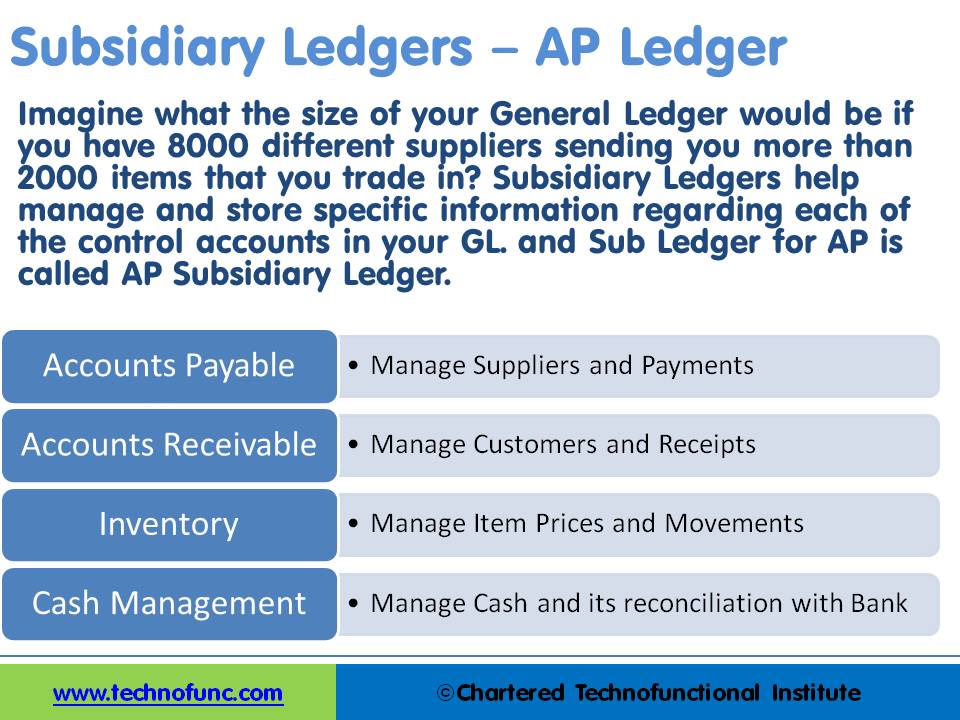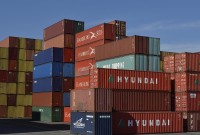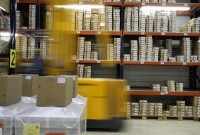- Home
- Business Processes
- Industry Knowledge
- Aerospace Industry
- Automotive Industry
- Banking Domain
- BFSI Industry
- Consumer/ FMCG Industry
- Chemicals Industry
- Engineering & Construction
- Energy Industry
- Education Domain
- Finance Domain
- Hospitality Domain
- Healthcare Industry
- Insurance Domain
- Retail Industry
- Travel and Tourism Domain
- Telecom Industry
- Leadership Skills
- eLearning
- Home
- Business Processes
- Warehouse Management
- Subsidiary Ledgers – AP Ledger
Subsidiary Ledgers – AP Ledger
An accounts payable invoice gets recorded in the Account Payable sub-ledger at the time an invoice is received and validated that the respective goods corresponding to the invoice have been received. Then it is verified and vouchered for payment as per the payment terms agreed with the Supplier.
Imagine what the size of your General Ledger would be if you have 8000 different suppliers sending you more than 2000 items that you trade in? Subsidiary Ledgers help manage and store specific information regarding each of the control accounts in your GL. and Sub Ledger for AP is called AP Subsidiary Ledger.
The purpose of Accounts Payable Sub ledger is to manage the suppliers and the payments related to purchases.
An accounts payable invoice gets recorded in the Account Payable sub-ledger at the time an invoice is received and validated that the respective goods corresponding to the invoice have been received. Then it is verified and vouchered for payment as per the payment terms agreed with the Supplier.

Related Links
You May Also Like
-
Transport operations are often divided into full load and part load and due to economies of scale, the unit costs are higher for part loads. Our customer needs several part loads delivering, so it can reduce costs by consolidating these into full loads. Then it gets all the part loads delivered to a warehouse near the suppliers, consolidates them into full loads, and pays the lower costs of full-load transport to its operations.
-
Before shipping, businesses need to make sure that the items will arrive in good condition. Packaging is a form of protection against environmental threats that the product will face from the time it leaves warehouse facility until the time it reached the customer. The packaging is intended to provide protection for the item as it is being handled in the warehouse or when the item is being shipped.
-
Types of Inventory Count Processes
While dealing with lots of inventory in a warehouse, lots of things can go wrong. Shipments may not have the right number of units in them, or they could get damaged somewhere along the supply chain. Discrepancies in the stock may arise as part of every inventory control, and need to be corrected immediately after the inventory control procedure has been finished.
-
Business Case of Multiple Warehouses
Adding extra warehouses to business provides many benefits such as reducing shipping costs, increasing storage capacity, and having warehouses for specific purposes to simplify overall warehouse management. Multiple warehouses allow you to organize your inventory in a way that helps your business be more effective.
-
This article discusses the key documents that gets generated during the import/export process. These documents may apply to both invoice to cash as well as order to cash cycles. Also learn the major custom docments for India.
-
After products have been received and passed a quality inspection, they need to be stored so that you can find them when you need them. This process is called putaway. The spot where you store a particular product is called a location. One section of a warehouse might have small locations for light items; another area may have large locations on the floor for heavy items.
-
When a customer wants a product that has been stored in the warehouse, the same need to be picked off the shelf (or off the floor) and get it ready for shipping. Depending on how big is the warehouse, picking can take a while. (Many distribution centers cover more than 1 million square feet.). Hence, warehouse order picking methods are an important aspect within any warehouse.
-
To stay competitive in today’s tough market, the location of your warehouse is vital. To grow retail business need to offer to customers faster and affordable shipping time, which is dependent on the warehousing location as the location of the warehouse affects the transit time to ship orders to customers.
-
In the normal course of business, customers are likely to return orders from time to time due to various reasons and business should design processes the manage and accept such returns. A well designed returns management process can reduce costs and issues associated with returns or exchanges.
-
Large companies have huge number of suppliers. To remain competitive they need to manage their procure to pay process very effectively. They create specialized division to handle these operations.
Explore Our Free Training Articles or
Sign Up to Start With Our eLearning Courses

About Us
Learning
© 2023 TechnoFunc, All Rights Reserved








